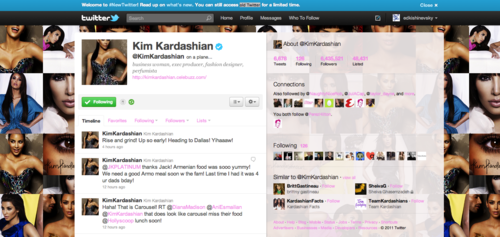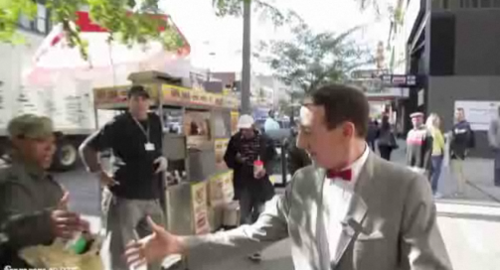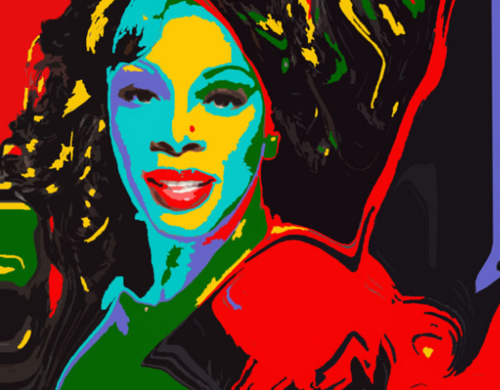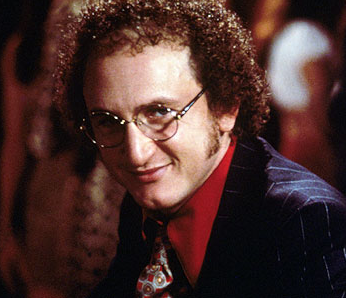meeting the makers with influx, @cotton
I've been wanting to write about the meet the makers conference I attended earlier this month which was put on by influx insights and Ed Cotton. It was a good exhibition and get together. Ed brought together an eclectic group of doers essentially, from a craft brooklyn bicycle maker Thomas Callahan of Horse Cycles to Behance co-founder and author Scott Belsky to Sarah Rich, of the 48-hour magazine Longshot.
Ed also had in Mark Barden, author of Eat Big Fish. He's a long time name in the business, and it was very grounding for me to see some of the work and new insight gathering techniques Mark had adopted that dovetailed with work I've been comfortable with for a while.

The session also included a 'creating an instant character' exercise run by improv performer Gary Hirsch of On Your Feet - which was fun, and got the group on their feet, collaborating and of course, making. (photos below).
The greatest impact on me was the Sarah Rich's 48-hour magazine (now called Longshot) - developed entirely online, and with submissions, ideas, and understandings also all gathered digitally and through Twitter/social media. This effort was the really the first step in my belief in the power of social media to create something very cool and positive, and not just some game or contest sponsored by a client.
This was a people effort. Which today brings me to step 2: Lady Gaga - and her use of Twitter to raise awareness for the Don't Ask Don't Tell policy and insistence of its repeal - which this past weekend Congress did in fact vote to strike. She didn't do it alone, but using her platform, she helped move this policy forward. That's a huge step for social media. It maybe Twitter is the channel or property of power, as the landscape begins to take shape. Myspace for music, Facebook for social calendar, fun, and pics. Twitter for news and business.


Denise Richards at SMW panel
Had this note on a celeb panel I attended from Social Media Week

The panel:
Celebrity Spokesperson in The Digital Age, Hosted by Hearst
Hosted at the Art & Culture Hub at Hearst
Event Description:
Gone are the days when a celebrity spokesperson only needed to do a couple of photo shoots and use the product. Today's smart brands are partnering with celebrities who have a direct relationship with their fans via social media channels. This panel will explore how mainstream celebs are using social media to increase their value and how social media all stars are turning themselves into brands.
Speakers:
Moderator: Kate White, Editor-in-Chief, Cosmopolitan
- Alisa Leonard, Director of Experience Planning, iCrossing, @alisamleo
- Rob Shuter, Publicist/ Blogger, PopEater, @NaughtyNiceRob
- Denise Richards, Actress
- Natalie Lent, Director of Strategy for ID, @natalielent
- Bryanboy, Fashion Blogger bryanboy.com
Before I pickup my draft, I though it was fun, more than anything. some instructional - in the sense that celebrities are using social media to engage directly with the public. but also in that celebrities are experimenting in the space. and that celebrities are having fun in social media. some are great at it like @KimKardashian - using twitter to stay on top of her reputation, quelch rumours about her family, etc.
i love lady gaga's mission for the DADT - which now challenges Malcolm Gladwell's blast against social media.
I'm not saying Twitter is behind the revolution in Egypt, but i do think of it as a power channel - information, education, advocacy, policy-influence. Yes.
Back to celebs, gossip columnist @NaughtyNiceRob, said sourcing isn't a big deal anymore because celebs come out on their and broadcast.
Below are the high points - there's also a great example of Twitter/Foursquare use by Pee Wee Herman to regenerate interest - great idea.

There was one other thing - that I think we as a culture/society need to figure out. That's the piece where education doesn't matter - like the fashion blogger with no actual experience or training. I have a feeling this is dangerous. as long as we digest @BryanBoy for fun, that's fine. when it gets more impactful, then we need to reassess.
High level points
The panel discussed celebrity involvement with social media.
Twitter is the hot button, probably rightfully so (my example is Lady Gaga – DADT, and Harry Reid)
EG: Power of Kim Kardashian to use her following
- for intelligence (as a giant focus group)
- to position herself and her family – as in quickly addressing any rumours,
- to promote her products
Celebrities and SM
Direct engagement with the audience/consumer – it’s exciting for the consumer to ‘interact’ with the celebrity, it gives them the idea they’re ‘co-creating’ and inputting into the celebrities activities.
Celebrities can
- endorse products
- get closer to their fans, maintain, build or re-build a relationship with their fans; (see PeeWee Herman case below which was a great example of using 2 social media vehicles – Twitter and Foursquare – for promotion and inclusion
- Raise awareness for charity, political, social concerns
Interesting program PeeWee’s Parade
PR strategist Natalie Lent described a very successful event program her group designed for PeeWee Herman featuring both Twitter and Foursqaure to rebuild awareness for the character. Lent admitted she did not know PeeWee from his playhouse days. The group devised a PeeWee Parade around New York and had him tweet and check in to places he went, like Katz’s deli, the Highline canal, his show on Broadway, and finished with a night of bowling with PeeWee at Bowlmor that only people who collected badges along the parade route, and went along the journey, could get into. I thought this was pretty cool. (My) NYTimes showed up along the route because they were following PW, not because they received a release. Links (the video is great):
BryanBoy consumer voice
The other point that I take from this is the BryanBoy blogger.
He’s become an influential voice in the fashion community with (I believe) over 120K monthly visitors/viewers. Marc Jacobs named a $5,000 bag after him.
Interesting because he admits he has no fashion background, training, skills, etc. to actually criticize the industry. He reports strictly on what he sees.
- True voice of the consumer, and the industry is listening – it’s amazing really – and in this sense – it’s great that industry is listening to its consumers. Pure, unadulterated.
- At the other end of the spectrum to me it’s like the analogy of watching a football game on tv and the commentator is your neighbor instead of Troy Aikmen. Sure your neighbor played in the backyard, and BryanBoy wears clothes. So they can both talk about it, yes, but with what level of knowledge or intelligence? How much of this is pandering?
Some SM rules, bits – which I think we pretty much know:
Greatest value: research – intelligence, direct engagement, Be: Transparent and Authentic Don’t be: Boring, Read: mashable, per Icrossing’s Leonard
Additional: It’s ok to take a moment to think (pause) before you broadcast
“you don't need sources anymore because the celebs themselves are saying what's up,” per columnist Shuter
check out these Facebook, Twitter social demographics
foursquare #fail
 This is a #foursquare #fail. check the exclamation points!! I like four square, but programmers, add some thinking to ur work.
This is a #foursquare #fail. check the exclamation points!! I like four square, but programmers, add some thinking to ur work.
Xer Pride, Let's see it Y
The GenY/GenX conversation has been percolating in my head, and I want to get some thoughts out.
GenY has repatriated the 80s, at least in Brooklyn. For me that's a fertile ground for discussion.

As an Xer, I think the revival is a bit exploitation and I'm more thinking about the dirth of GenY's own culture/cultural content - is it just tattoos, gourmet cheese, and board games at the bar? I know there is a civic/community sense as well, but i think within the group there's struggle to define their purpose and direction. #Occupy may have had good intentions, but really fizzled, and embarrassed itself. I realize the group is young, but coming of age - if it's happening - will be later in their lives. (Like for some of us as well.)
There are factors, as akin to being our younger siblings, they both - looked up to us, and were also more sheltered. We were the latch key kids, the independent group, that started today's work cycle of indy jobs, self-reliance and switching jobs every 2-3 years. We adapted to the changing face of business, ie we realized there were no 30-year factory jobs, no 1-company careers. Just not a reality for us, and I think we felt this at a young age, and were able to set forth a path, or platform, for some semblance of individual success in an increasingly unforgiving corporate environment.
The music played today, is disco, MJ, or alternative 90s technopop.
I know GenY is into green and community - and they do everything together, which for me, comes back to the sheltered space, along with the extended education piece. I think Gen X - we kind of bareknuckled it out to the real world.
I also think, though, when i was today's Gen Y age - during the mid90s, it was the 70s that were making a cultural comeback. I bought and wore vintage 70s threads, and remember films like Carlito's Way exploiting the 70s landscape. Vince Vaughn, Ben Stiller and Owen Wilson brought back Starsky & Hutch, there was the indy Royal Tannenbaums. And let's not forget Matthew Mcconaughey of Dazed and Confused. So we also borrowed, to be truthful.

Sterling Brands had a recent post also on the subject, noting GenY doesn't know about Jeff Spicoli, but we as Gen X know about Snooki.
The board games at bars is another connecting piece. Sorry, Connect4 and Monopoly being commonplace at bars is like the kids taking their home family rooms out now to the bar. This is a departure from GenX. We are a transitional generation - we embrace and respect older values, but execute and interpret for today's world. We didn't play board games at bars. We followed the Miller High Life Man, and Homer Simpson when they went to the bar - we drank and hung out, shot the shit. We respected the bar as adult playtime, not kiddie playtime.
So, the time is coming near for GenY to make a statement. Are they playing the coddled kids who go bad in Over the Edge? What will be their impact per the civic/community mindedness Strauss and Howe have laid out for them? Charles Murray on the other hand sees the tattoos, clusterization, and is stark in his call for strength, character for the benefit of the nation.
I'm biased through my X lense, that my upbringing was sound and enabling. I like they youthful spirit of GenY, and I like the tech platform, but I'm reserved in my grants of respect. I need to see it.